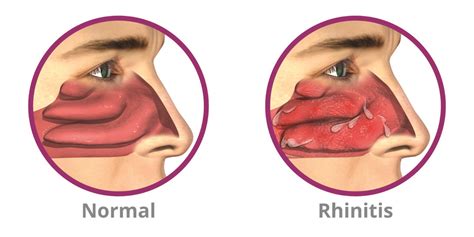Rhinitis: Symptoms, Causes, and Effective Relief Measures
Rhinitis FAQ
What are the symptoms of rhinitis?
Symptoms of rhinitis range from mild to severe. They generally affect your nasal cavity, throat, and eyes. They can include: What causes rhinitis?
What are the different types of chronic rhinitis?
Medical professionals usually categorize chronic rhinitis into two main groups depending on the underlying cause: Allergic rhinitis: Also known as hay fever, this can occur because of an allergic response to specific allergens, such as pollen, dust, or pet dander.
What is non-allergic rhinitis?
Non-allergic rhinitis happens when the inside of your nose becomes irritated, causing a blocked or runny nose. It can be treated with medicines from a pharmacist or GP. Sometimes non-allergic rhinitis can also cause a crust to form inside the nose. This may have a bad smell and bleed if you try to remove it.
What is the difference between rhinitis and sinusitis?
Rhinitis occurs when the nasal mucosa becomes inflamed or irritated. Sinusitis, on the other hand, is the inflammation of the lining of the sinuses, which are the four pairs of hollow air-filled spaces in the skull. The sinuses become blocked and filled with fluid, causing germs to proliferate.
What does rhinitis mean?
Rhinitis is a term used to describe inflammation of the lining of the nose. It usually involves a blocked, runny or itchy nose and possibly bouts of sneezing. What is Rhinitis? What is the treatment? Where can I get further information? Who can I contact with any concerns or questions? What is Rhinitis?
What is allergic rhinitis?
Allergic rhinitis is where your nose gets irritated by something you're allergic to, such as pollen, causing sneezing and other symptoms. For most people it's easy to treat with medicines from a pharmacist. Common symptoms of allergic rhinitis are similar to a cold and include:
How common is allergic rhinitis?
It’s a very common condition, estimated to affect around one in every five people in the UK. Allergic rhinitis typically causes cold-like symptoms, such as sneezing, itchiness and a blocked or runny nose. These symptoms usually start soon after being exposed to an allergen.
Rhinitis References
If you want to know more about Rhinitis, consider exploring links below:
What Is Rhinitis
- https://www.nhs.uk/conditions/non-allergic-rhinitis/
- https://www.mayoclinic.org/diseases-conditions/nonallergic-rhinitis/symptoms-causes/syc-20351229
- https://www.topdoctors.co.uk/medical-dictionary/rhinitis
- https://www.healthline.com/health/chronic-rhinitis
- https://www.hopkinsmedicine.org/health/conditions-and-diseases/rhinitis
- https://www.buoyhealth.com/learn/rhinitis
- https://www.merckmanuals.com/home/ear,-nose,-and-throat-disorders/nose-and-sinus-disorders/rhinitis
- https://en.wikipedia.org/wiki/Rhinitis
Rhinitis Information
- https://patient.info/ears-nose-throat-mouth/persistent-rhinitis-sneezing
- https://www.nhsinform.scot/illnesses-and-conditions/ears-nose-and-throat/allergic-rhinitis
- https://www.uhsussex.nhs.uk/resources/managing-rhinitis/
- https://www.msdmanuals.com/en-gb/home/ear,-nose,-and-throat-disorders/nose-and-sinus-disorders/rhinitis
- https://cks.nice.org.uk/topics/allergic-rhinitis/
Explore Related Topics
Asthma Action Plans for Seasonal Asthma Flares: Are They Different?
Explore how Asthma Action Plans need to be adapted or modified to cope with seasonal asthma triggers.
